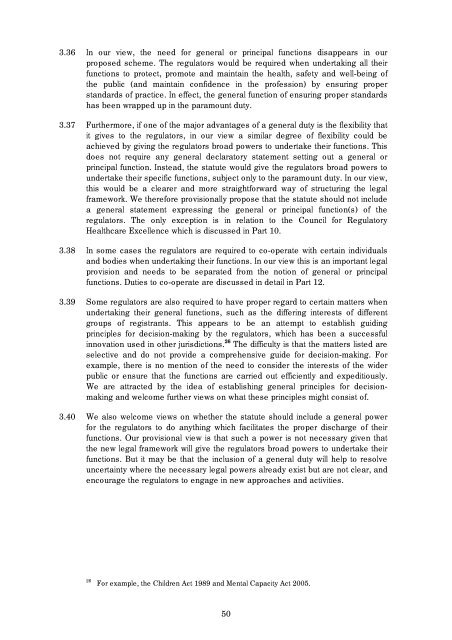Regulation of Health and Social Care Professionals Consultation
Regulation of Health and Social Care Professionals Consultation
Regulation of Health and Social Care Professionals Consultation
You also want an ePaper? Increase the reach of your titles
YUMPU automatically turns print PDFs into web optimized ePapers that Google loves.
3.36 In our view, the need for general or principal functions disappears in our<br />
proposed scheme. The regulators would be required when undertaking all their<br />
functions to protect, promote <strong>and</strong> maintain the health, safety <strong>and</strong> well-being <strong>of</strong><br />
the public (<strong>and</strong> maintain confidence in the pr<strong>of</strong>ession) by ensuring proper<br />
st<strong>and</strong>ards <strong>of</strong> practice. In effect, the general function <strong>of</strong> ensuring proper st<strong>and</strong>ards<br />
has been wrapped up in the paramount duty.<br />
3.37 Furthermore, if one <strong>of</strong> the major advantages <strong>of</strong> a general duty is the flexibility that<br />
it gives to the regulators, in our view a similar degree <strong>of</strong> flexibility could be<br />
achieved by giving the regulators broad powers to undertake their functions. This<br />
does not require any general declaratory statement setting out a general or<br />
principal function. Instead, the statute would give the regulators broad powers to<br />
undertake their specific functions, subject only to the paramount duty. In our view,<br />
this would be a clearer <strong>and</strong> more straightforward way <strong>of</strong> structuring the legal<br />
framework. We therefore provisionally propose that the statute should not include<br />
a general statement expressing the general or principal function(s) <strong>of</strong> the<br />
regulators. The only exception is in relation to the Council for Regulatory<br />
<strong>Health</strong>care Excellence which is discussed in Part 10.<br />
3.38 In some cases the regulators are required to co-operate with certain individuals<br />
<strong>and</strong> bodies when undertaking their functions. In our view this is an important legal<br />
provision <strong>and</strong> needs to be separated from the notion <strong>of</strong> general or principal<br />
functions. Duties to co-operate are discussed in detail in Part 12.<br />
3.39 Some regulators are also required to have proper regard to certain matters when<br />
undertaking their general functions, such as the differing interests <strong>of</strong> different<br />
groups <strong>of</strong> registrants. This appears to be an attempt to establish guiding<br />
principles for decision-making by the regulators, which has been a successful<br />
innovation used in other jurisdictions. 26 The difficulty is that the matters listed are<br />
selective <strong>and</strong> do not provide a comprehensive guide for decision-making. For<br />
example, there is no mention <strong>of</strong> the need to consider the interests <strong>of</strong> the wider<br />
public or ensure that the functions are carried out efficiently <strong>and</strong> expeditiously.<br />
We are attracted by the idea <strong>of</strong> establishing general principles for decisionmaking<br />
<strong>and</strong> welcome further views on what these principles might consist <strong>of</strong>.<br />
3.40 We also welcome views on whether the statute should include a general power<br />
for the regulators to do anything which facilitates the proper discharge <strong>of</strong> their<br />
functions. Our provisional view is that such a power is not necessary given that<br />
the new legal framework will give the regulators broad powers to undertake their<br />
functions. But it may be that the inclusion <strong>of</strong> a general duty will help to resolve<br />
uncertainty where the necessary legal powers already exist but are not clear, <strong>and</strong><br />
encourage the regulators to engage in new approaches <strong>and</strong> activities.<br />
26 For example, the Children Act 1989 <strong>and</strong> Mental Capacity Act 2005.<br />
50
















